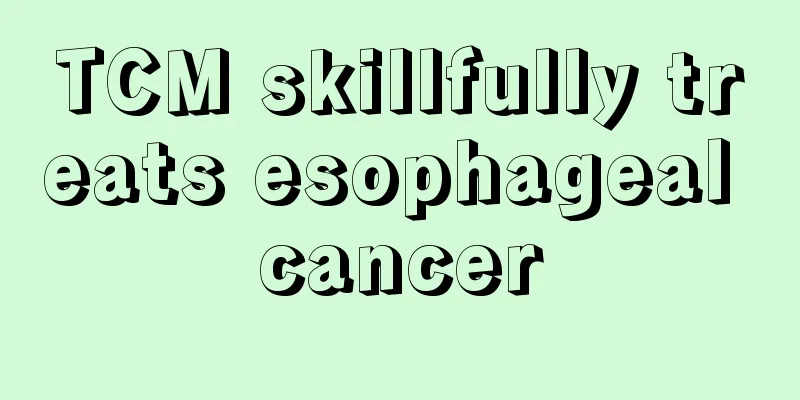Foods that nasopharyngeal cancer patients can eat

|
Nasopharyngeal cancer is a disease that seriously affects the physical and mental health of patients. Usually, patients will experience symptoms such as nose bleeding, nasal congestion, and headache within a few days of onset, which will then bring more physical complications. In addition to coping with conventional treatment, everyone should also actively make reasonable arrangements in their daily diet so that their bodies can recover as soon as possible. So, what are the specific dietary precautions? 1. Foods that produce dampness and resolve phlegm, are sticky and heavy, should be used sparingly in meals and complementary foods, such as kelp, laver, asparagus, jellyfish, etc. When symptoms of liver fire such as dizziness, deafness, bitter mouth, irritability, etc. occur, it is advisable to choose products that clear the liver and relieve heat, nourish yin and suppress yang to alleviate the symptoms, such as chrysanthemum tea, stir-fried cassia seed coffee, kuding tea, day lily, bitter melon, wolfberry seedlings, plums, abalone, mustard greens, etc. 2. During radiotherapy, patients should be encouraged to drink more water, light beverages, juice, milk, etc. The staple food should be semi-liquid or soft food. For side dishes, fresh vegetables and fruits should be eaten more, especially carrots, water chestnuts, white radish, tomatoes, lotus roots, white pears, oranges, lemons, hawthorns and other fruits. The taste of food should be light and sweet, but it is not advisable to drink too much raw and cold food to avoid cold stomach. Plums, monk fruit, olives, green fruits, etc. in the mouth can stimulate saliva secretion and relieve dryness symptoms. 3. Choose more foods that clear away heat, detoxify, nourish yin and promote the production of body fluids. Regardless of the stage or syndrome, attention should be paid to the diversity of food and the carefulness of cooking to help patients take in enough nutrients. Fourth, the appetite of patients in the late stage is very poor. Appetite should be stimulated to digest food, and increasing intake is the fundamental measure to ensure treatment. Therefore, it is advisable to choose foods that are easy to digest, nutritious, and have good color, aroma, and taste, such as porridge, soup, soup, juice, etc. The diet should be moist and palatable, and aromatic and turbid, such as rock sugar and barley porridge, coriander stewed big carp, fresh pomegranate, fresh black plum, Guanggan, citron, pineapple, green plum, water chestnut, water chestnut, white pear, etc. Usually, Tibetan green fruit and fresh mountain plants are held in the mouth, which have the effects of anti-inflammatory, sterilization, clearing the throat and promoting salivation. Patients with symptoms of nasopharyngeal carcinoma recurrence are in great pain and have a poor quality of life. They often experience severe pain in the face and tongue, and in severe cases, they may even feel like dying. They need to take strong analgesics for a long time. The nasopharynx is close to the skull base and the internal carotid artery. Recurrence of nasopharyngeal carcinoma can invade the skull base bone and then spread into the brain, causing severe headaches and cranial complications, and ultimately leading to death. Recurrence of nasopharyngeal carcinoma often invades the internal carotid artery, leading to fatal hemorrhage. In addition, since patients often have limited mouth opening after radiotherapy, it is very difficult for doctors to stop bleeding. Therefore, they are often helpless and have to watch patients bleed to death. Most nasopharyngeal carcinomas are undifferentiated carcinomas or poorly differentiated squamous cell carcinomas, which are sensitive to radiation. Therefore, radiotherapy is usually the first choice for nasopharyngeal carcinoma. Radiotherapy is relatively effective for most nasopharyngeal carcinomas, with a cure rate of about 60%, but 40% of patients still experience symptoms of nasopharyngeal carcinoma recurrence after radiotherapy. There are many factors that cause NPC recurrence, including tumor biological characteristics, clinical staging, and treatment techniques. The earlier the clinical staging, the better the treatment effect and the lower the recurrence rate. There are also new cancer foci that recur on the basis of local squamous metaplasia after more than 10 years of radiotherapy for NPC. In order to better prevent the recurrence and metastasis of nasopharyngeal carcinoma, it is best to perform biological immunotherapy after radiotherapy. Biological immunotherapy can kill residual cancer cells, improve the therapeutic effect of radiotherapy, reduce the toxic side effects of radiotherapy, enhance the patient's immune ability, better prevent metastasis and recurrence, and maximize the survival period. Through the above detailed introduction, I believe that everyone must have a deeper understanding now. Everyone should actively carry out effective outdoor exercise in daily life to enhance their body resistance. In addition, if nasopharyngeal cancer occurs, it is necessary to use the above methods appropriately to make a favorable attempt to restore health as soon as possible. |
<<: What foods should not be eaten if you have nasopharyngeal cancer?
>>: Introducing a recipe for nasopharyngeal carcinoma patients
Recommend
How many days after sex can pregnancy be detected
How many days after having sex can you detect pre...
What are the benefits of wearing sweatpants
Some people like to wear sports pants when exerci...
Is one breast larger than the other a sign of breast cancer?
One breast is larger than the other, which may be...
What is the significance of cerebrovascular function testing
There are many diseases of the cerebrovascular sy...
Symptoms of tendinitis fingers_Symptoms of tendinitis
Patients with tendonitis often feel pain, and the...
What are the pathological diagnostic criteria for pancreatic carcinoma in situ
With the continuous progress of society, there ar...
What are the treatments for rotavirus diarrhea
Diarrhea caused by rotavirus is often more troubl...
How long can a filling be used_How long can the filling material be used
Nowadays, many people do not pay attention to ora...
The top ten most delicious snacks in the world
Snacks play a relatively important role in our di...
There are some tips on how to exercise when you have thyroid disease
The high-pressure work and high-pressure life of ...
What are the symptoms of gallbladder cancer
For many people, gallbladder cancer is not a simp...
How to treat throat herpes?
Pharyngitis is one of the more common diseases in...
How to eat healthily to avoid liver cancer? Be careful of liver cancer if you eat this kind of food
Sashimi is especially popular among Japanese peop...
What is the function of activated carbon in gas masks
We all know that gas masks are more effective in ...
What are the treatments for acute arthritis?
Arthritis is divided into chronic and acute. Acut...









